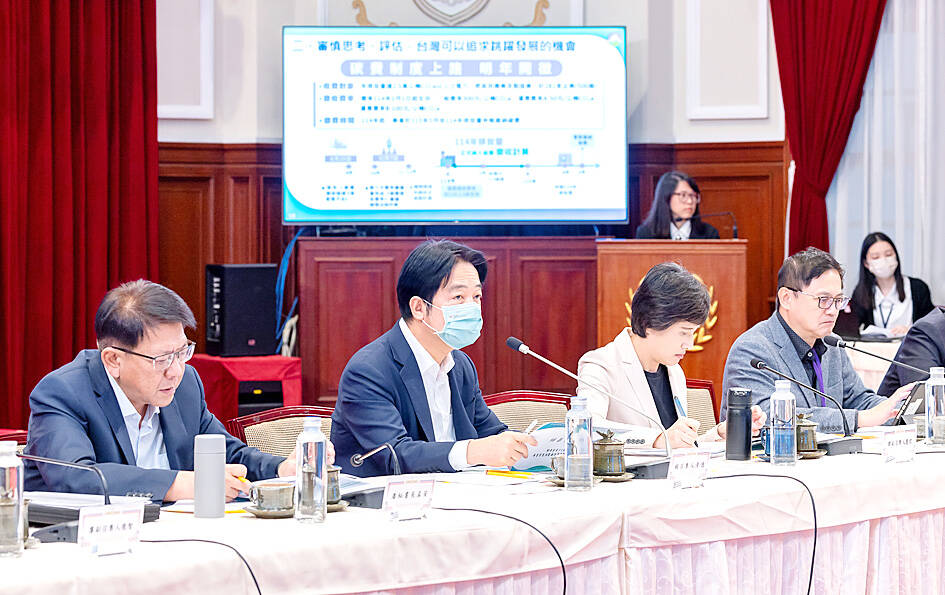The government should provide more incentives to invest in energy-saving technology and equipment, business representatives told a news conference after a climate change committee meeting on Thursday.
Paul Peng (彭浪), chairman of LCD maker AUO Corp, during the meeting called for more incentives for companies to invest in energy storage and energy-saving technology, Presidential Office Deputy Secretary-General Xavier Chang (張淳涵) said.
Lai Po-szu (賴博司), chairman of the Manufacturers United General Association of Industrial Park of ROC, told the meeting that incentives such as tax credits would motivate big and small businesses to double down on efforts to save energy, Chang said.

Photo courtesy of the Presidential Office
Peng and Lai are members of the National Climate Change Committee, which convened at the Presidential Office for the second time since its establishment in June.
Vice Minister of Economic Affairs Lien Ching-chang (連錦漳) said that the government has plans to revise laws, particularly the Statute for Industrial Innovation (產業創新條例), to increase funding aimed at incentivizing enterprises to save energy.
He was referring to proposed revisions — which still require legislative approval — announced on Oct. 4 by the Ministry of Economic Affairs.
Among the proposed amendments is a plan to increase the cap on investments in industrial structure optimization that qualify for tax credits to NT$1.8 billion (US$56.13 million) from NT$1 billion.
Saving energy and reducing carbon emissions were the focus of Thursday’s talks, with government officials reaffirming the goal of saving 20.6 billion kilowatt-hours (kWh), or about 7.3 percent of the electricity generated last year, over four years.
That would reduce carbon emissions by about 10.18 million tonnes, according to government estimates.
In the first eight months of this year, electricity generation was up 2.3 percent from the same period last year.
Minister of Environment Peng Chi-ming (彭啟明) told the meeting that the government aims to update its carbon reduction targets in the period leading up to 2032 to reflect more ambitious net zero goals.
Hopefully the government would finalize a “flagship program,” including new goals in the years leading up to 2032 and beyond, as well as updated measures to reduce carbon emissions with “greater ambition,” Peng said in his presentation before the committee entered closed-door discussions.
The nation’s goal is to reduce emissions by 23 to 25 percent by 2030 compared with the 2005 levels.
Although Taiwan was on the right track, the new goals would “make the figures look better,” provided the yet-to-be-announced “flagship program” was well implemented, Peng said.
Peng’s comments appeared to be a departure from those he made in an interview in August, when he said that Taiwan only reduced its carbon emissions by 1.8 percent in 2022 compared with 2005 levels and that reaching the 2030 goal would “in reality be hard.”
During his presentation, the minister did not provide details on what the “flagship program” would entail, but said that it would focus on developing more green energy sources, charging carbon fees and saving energy.
The committee serves as a policy advisory group, with ideas and suggestions made during its meetings referred to Cabinet-level agencies for further planning and implementation.
The committee is presided over by President William Lai (賴清德) and has about 30 members, including government officials, academics, and representatives of businesses and civil society groups.

An essay competition jointly organized by a local writing society and a publisher affiliated with the Chinese Communist Party (CCP) might have contravened the Act Governing Relations Between the People of the Taiwan Area and the Mainland Area (臺灣地區與大陸地區人民關係條例), the Mainland Affairs Council (MAC) said on Thursday. “In this case, the partner organization is clearly an agency under the CCP’s Fujian Provincial Committee,” MAC Deputy Minister and spokesperson Liang Wen-chieh (梁文傑) said at a news briefing in Taipei. “It also involves bringing Taiwanese students to China with all-expenses-paid arrangements to attend award ceremonies and camps,” Liang said. Those two “characteristics” are typically sufficient

A magnitude 5.9 earthquake that struck about 33km off the coast of Hualien City was the "main shock" in a series of quakes in the area, with aftershocks expected over the next three days, the Central Weather Administration (CWA) said yesterday. Prior to the magnitude 5.9 quake shaking most of Taiwan at 6:53pm yesterday, six other earthquakes stronger than a magnitude of 4, starting with a magnitude 5.5 quake at 6:09pm, occurred in the area. CWA Seismological Center Director Wu Chien-fu (吳健富) confirmed that the quakes were all part of the same series and that the magnitude 5.5 temblor was

The brilliant blue waters, thick foliage and bucolic atmosphere on this seemingly idyllic archipelago deep in the Pacific Ocean belie the key role it now plays in a titanic geopolitical struggle. Palau is again on the front line as China, and the US and its allies prepare their forces in an intensifying contest for control over the Asia-Pacific region. The democratic nation of just 17,000 people hosts US-controlled airstrips and soon-to-be-completed radar installations that the US military describes as “critical” to monitoring vast swathes of water and airspace. It is also a key piece of the second island chain, a string of

The Central Weather Administration has issued a heat alert for southeastern Taiwan, warning of temperatures as high as 36°C today, while alerting some coastal areas of strong winds later in the day. Kaohsiung’s Neimen District (內門) and Pingtung County’s Neipu Township (內埔) are under an orange heat alert, which warns of temperatures as high as 36°C for three consecutive days, the CWA said, citing southwest winds. The heat would also extend to Tainan’s Nansi (楠西) and Yujing (玉井) districts, as well as Pingtung’s Gaoshu (高樹), Yanpu (鹽埔) and Majia (瑪家) townships, it said, forecasting highs of up to 36°C in those areas